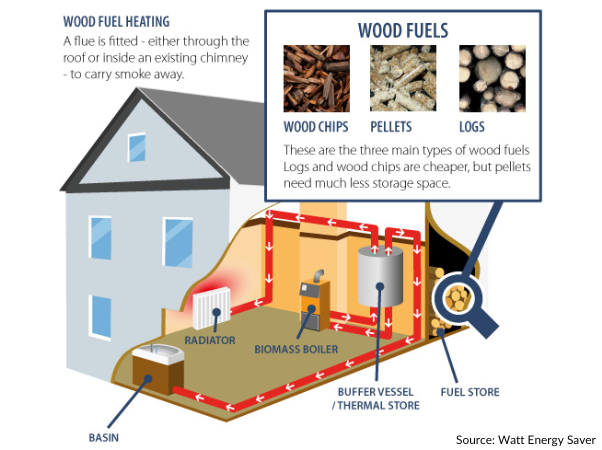 Free delivery on orders over £75 ex VAT
Free delivery on orders over £75 ex VAT Free click & collect from branches nationwide
Free click & collect from branches nationwideBiomass Installer Guide
‘Biomass’ refers to fuel from a renewable source, which can be used to heat your home via a biomass boiler or biomass heating system.
Homeowners are increasingly turning towards renewable energy heating solutions such as biomass boilers - meaning installers are expected to help customers evaluate, select, and install the best biomass boiler for their needs.

Types of Biomass Boiler
Installers can recommend a range of different biomass boilers to fit customers' needs. Biomass boiler types are differentiated based on the type of biomass they use for fuel.
- Wood pellet biomass boilers - Wood pellet biomass boilers are the most commonly installed type of biomass boiler, and are best suited for the vast majority of households. Wood pellet boilers are easy for homeowners to maintain, and the pellets themselves are relatively cheap and easy to store.
- Wood chip biomass boilers - Wood chip biomass boilers are best suited to larger systems that demand 60kW or greater. Halls and other large buildings utilise wood chip biomass boilers due to their fuel density, and large storage requirements.
- Wood log biomass boilers - Customers with a plentiful supply of local logs may opt for a wood log biomass boiler, due to cheap local supply. Log biomass boilers require more maintenance and regular cleaning in comparison to other types of biomass boilers, however they can work out cheaper for some.
Many chip and pellet biomass boilers feature automatic fuel feeders, which refill the boiler automatically at timed intervals or as required. This makes biomass boilers run very similarly to traditional boilers, with minimal user input needed on the customers’ part.
Considerations when installing a Biomass Boiler
As with any boiler, installers must carry out the necessary heat load calculations to determine the correct size of boiler. This will help ensure the heating system isn’t over or under-sized, and will allow you to provide customers with the most effective and efficient option possible.
Another consideration is biomass storage. Most homeowners will use their garage or convert a room to store their biomass fuel, or some will want to build a shed or store to keep large amounts of fuel.
How much space is required to install a Biomass Boiler?
A standard wood pellet biomass boiler will require around 10 square meters of space. The full system will consist of the boiler itself, an accumulation tank, a fuel storage and automation system, an expansion vessel, and a chimney.
Hand fed boilers or external boilers can reduce space requirements, however users will still need somewhere to store pellet bags.
Can existing heating systems be used with Biomass Boilers?
Yes. Biomass boilers produce similar flow temperatures to gas or oil boilers, therefore installers can connect biomass boilers to any standard domestic heating system and a complete heating system overhaul is not required if a customer plans on switching to biomass.
Is a hot water cylinder required for a Biomass Boiler?
Yes. Biomass boilers are designed to work in tandem with a hot water cylinder, making them a requirement for biomass boiler installations.

Is planning permission required for Biomass Boiler installation?
Planning permission is not usually required when it comes to biomass boiler installation. However, if the boiler is being installed externally, it may be required.
If the installation requires an external flue, it will typically be permitted development if the following conditions are met:
- Flues on the side or rear elevation of the building are allowed up to one meter above the highest part of the roof
- If the building is listed or within a designated area, you’ll need to check with the local planning authority before a flue is fitted.
- If the building is in a conservation area or a world heritage site, a flue should not be fitted on the side or principal elevation if visible from a highway.
How long will it take to install a Biomass Boiler?
Timescales vary depending on the size of the boiler, the type of boiler, and the property’s accessibility.
After an initial survey has been carried out, the vast majority of biomass boiler installations are finished within 2-3 working days.
How long does a Biomass Boiler last?
Quality biomass boilers are extremely reliable and well-engineered. When installed correctly and regularly maintained by users, they can last for over 20 years - considerably longer than many other heating systems.
Learn More and Become MCS-accredited with City Plumbing and GTEC
We've partnered with GTEC to offer MCS-accredited training to take your renewable installations to the next level.
Learn how to install Solar, Air Source & Ground Source Heat Pumps, EV Chargers, and all other main types of renewable technology. Become certified to upskill your business and take advantage of increased demand ahead of net zero.


